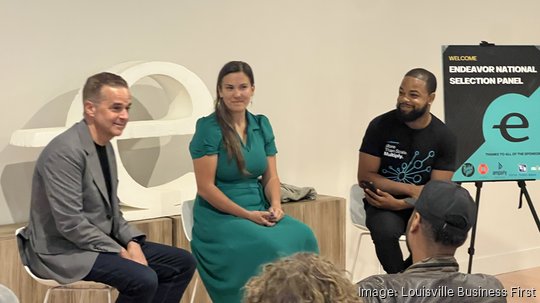
Editor’s note: This is the second story of a two-part series. The first part is linked below.
Work-life balance.
A three-word “buzz term,” for sure, but can there be such a thing in the life of a founder?
That was one of the last questions that was presented to RxLightning Founder/CEO Julia Regan and RealizedCare CEO Aaron Gani at a fireside chat on the closing day of Endeavor’s recent National Selection Panel event in Louisville on April 19.
The question was posed by the moderator, an Endeavor Midwest team member, Tim Barr, Jr., based out of Cincinnati.
Note: For the first part of the conversation — and more background on Gani and Regan and their companies — please see the first story of the series.
“Probably not well,” Regan said of her early attempts to allow her work life and personal life to exist in separate realms.
That has changed, though, recently with the hiring of an executive coach, Byron Morrison, who specializes in working with CEOs in Regan’s situation.
Through Morrison, she has embraced the concept of “push-pull days,” where sometimes you are in the fray (pull), while other times not.
“I always thought I had to do everything. And I always thought I had to be present for my team constantly, which I think I’ve been able to step back and see … that’s not necessarily what I want them to aspire to do, because it's not healthy for everyone.”
On a push day, Regan most likely will not go into the office, and instead will run errands or take care of her family while still being accessible.
“[Those are] actually my most productive days, because I’m not in the weeds … I step back,” said Regan, who added that when she has her kids she leaves the office at 2:30 p.m.
When a CEO/leadership team member does find the right cadence, Regan said it was important to make a commitment to that.
“It’s very easy to get pulled back into the chaos of working and interacting with people,” she said.
Gani starts most days with an early morning workout, but always makes sure that from 5:30 p.m. on he is done with work and focused on time with his family.
He agreed with Regan on the importance of having those push days.
“You just got to give yourself a little bit of room to be like, ‘I’m not doing that today. I’m gonna go do whatever it is I need to do to preserve my sanity,’” Gani said.
During his opening comments, Gani mentioned that he worked out in a VR platform earlier that morning. One platform allows him to workout in different parts of the world, while another one simulated being in a boxing ring — which can often be a metaphor for a tough day.
One of those days where “I’ve got punched really hard at work,” Gani finds comfort and mindfulness in engaging with the same time of digital therapeutics that his company is selling to its clients. This includes meditating through VR, which like the workout platform, allows him to go to a beach or the top of a mountain or many other places far away from Kentucky.
“It seems like it would not make a big difference, but it does,” he told the audience. “The multi-sensory stimulation of being in a whole other place…”
To which, Barr asked the question we all wanted to: Are you not meditating with your eyes closed?
“You’re sitting on a mountaintop, looking at a sunrise and there’s nothing around and it’s peaceful and you’re hearing the sounds of nature, which [makes you] close your eyes,” Gani clarified.
Gani added that he frequently hears that people who have struggled to meditate through traditional means, have been able to have much better success when they have tried it through VR.
The power of delegating
When it was time for the audience to ask questions, the first one centered on the idea of letting go while scaling up his/her company.
Regan said that was a struggle for her at first, leaving her “constantly in a spiral,” That was until she read one of Morrison’s books, “Think Like a CEO,” that had her create an inventory for a week of how she was spending her time. The exercise made her realize how often she was over-scheduling, for one. To this day, she repeats the exercise every 30 days.
From there, Regan timestamps her schedule, as best as he can and then has someone hold her accountable for sticking with what she has planned, whom she calls her “accountability partner.”
“There’s a natural tendency — especially coming from a founder to a leader to say, ‘I could go fix that … but just because I could do it, if I have somebody in place, I should not be doing it. I should be allowing them to do it because if I keep undermining them, we’re not going to grow.”
Gani said he found the Entrepreneurial Operating System (EOS) platform (used by many founders) very helpful when getting everyone aligned with his company’s values, long-term goals and short-term goals and the like — while also having a built-in accountability system. This helps his team and he always center their efforts around one key question: “What are the most important things right now? … Just to know if you’re delegating correctly and you’re able to stay connected.”






